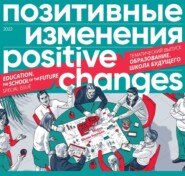По всем вопросам обращайтесь на: info@litportal.ru
(©) 2003-2024.
✖
Позитивные изменения. Том 3, № 3 (2023). Positive changes. Volume 3, Issue 3 (2023)
Настройки чтения
Размер шрифта
Высота строк
Поля
Артем Шадрин, директор Института социально-экономического проектирования НИУ ВШЭ, считает, что «обучение служением» – это очень интересный сюжет о реальной востребованности прикладного проектного обучения для реализации проектов социальной направленности. Оно позволяет развивать профессиональные навыки и soft skills студентов, мотивируя их при этом важными, социально значимыми результатами проектов, которые они осуществляют[51 - Методические рекомендации по реализации модуля «Обучение служением» в образовательных организациях высшего образования Российской Федерации. (2023). Режим доступа: https://nark.ru/upload/iblock/7bb/v3x8h3ar13°5umz1woovwwrgvdnhgyjf/Metod_rekomendatsii_Obuchenie-sluzheniem.pdf. (дата доступа: 26.08.2023).]. А некоммерческим организациям партнерство с университетами дает серьезный дополнительный ресурс.
По его словам, формат «обучения служением», когда университет может реально помочь НКО, – это очень хорошая история для создания контактов, углубления знакомства и формирования более широкой повестки сотрудничества. Для вузов в рамках идеологии проектного обучения крайне важно наличие интересных, мотивирующих и при этом профессионально развивающих содержательных задач. Руководители и сотрудники НКО – чаще всего увлеченные, харизматичные люди, с которыми интересно работать, поэтому предоставление студентам возможности быть в таких командах – дополнительный выигрыш для университета, позволяющий привлечь лучших абитуриентов.
«В целом, это история про взаимный выигрыш, поэтому я считаю максимально актуальной задачу по развитию такого сотрудничества, – поясняет Шадрин. – Кстати, в инженерной сфере проектное обучение в нашей стране имеет большую историю. Еще во времена «плановой экономики» студенты-инженеры в процессе обучения делали реальные, работающие проекты. Сейчас эта практика прикладного проектного обучения распространяется и на социально-гуманитарные дисциплины».
Так, в последние годы более чем в ста вузах страны был запущен формат юридических клиник, где студенты-юристы в рамках закона о бесплатной юридической помощи безвозмездно консультируют граждан по правовым вопросам. В СПбГУ помимо юридических клиник существует еще 15 клиник по другим направлениям[52 - Санкт-Петербургский государственный университет. (2023). Практика по модели клиники в СПбГУ. Режим доступа: https://spbu.ru/studentam/praktika-po-modeli-kliniki-v-spbgu. (дата доступа: 25.08.2023).]: социальная работа, педагогическая деятельность, психологическая помощь и др., это называется форматом «клинической практики»[53 - Лаврикова, М. Ю. & Русакова, М. М. (2021). Современный рынок труда и образование: клинический подход как ответ на потребность изменений в обучении. Режим доступа: https://spbu.ru/sites/default/files/kliniki_spbgu.pdf. (дата доступа: 25.08.2023).].
«В таком же формате, например, студенты факультетов экономики и медиакоммуникаций могут помочь НКО выстроить маркетинговую и коммуникационную стратегию, айтишники – настроить информационные системы, студенты-архитекторы, дизайнеры, специалисты по урбанистике и градостроению, социологи – помочь в реализации проектов благоустройства территорий. Могут быть массово реализованы и просветительские проекты для школьников по направлениям естественных, гуманитарных, инженерных и социальных наук. Существует большое количество направлений, связанных с профессиональной деятельностью студентов и имеющих значимый эффект. «Обучение служением» дает практически неограниченные возможности по реализации себя в общественно-полезной деятельности», – резюмирует Артем Шадрин.
РАБОТА С БУДУЩИМ
Выделение «обучения служением» в отдельное направление и последовательное, целенаправленное внедрение его в России, что называется, назрело. И это не мода, и не быстропреходящая тенденция – это совершенно естественная адаптация к новому, меняющемуся миру, где все ценнее становится осознанность каждого отдельного человека. Так же, как на смену печатной машинке пришли современные технологии в виде компьютеров, смартфонов и интернета, сейчас все сложнее представить себе учреждение высшей школы, где не внедряются образовательные технологии, актуальные в первую очередь с точки зрения гуманизма, ценностей, принятых в современном обществе. Вернее, представить, конечно, можно, но такой вуз просто не выдержит конкуренции с теми, кто улавливает новые тенденции и внедряет их у себя.
И хотя существует еще масса противоречий: должно это быть основной программой или факультативом, непрерывным обучением или нет, всех ли студентов без исключения стоит погружать в эту историю, возможна ли мультидисциплинарность, что лучше – групповой или индивидуальный подход, чья должна быть инициатива и проч. – процесс стартовал – и стартовал мощно. А что будет в будущем (а «обучение служением» это именно работа с будущим) – скоро узнаем!
Service Learning: Global Trend Comes to Russia
DOI 10.55140/2782–5817–2023–3–3–15–25
Starting September 1, 2023, a new educational module known as “Service Learning” has been introduced across 100 Russian universities. The concept is a brainchild of the collaboration between the experts from the Ministry of Education and Science, the Association of Volunteer Centers, and the Higher School of Economics. The trend of reshaping higher education institutions into socially-conscious entities, enabling students to actively contribute to societal progress, is rapidly gaining momentum worldwide. In this feature, we delve into the origins of this initiative that plays its role in nurturing both higher education and the nonprofit sector. We also explore the ongoing implementation of this methodology in Russia, along with valuable insights from key experts in the field, providing a glimpse into what lies ahead.
Tatiana Pechegina
Journalist
Alina Yashina
Deputy Chair of the Association of Volunteer Centers Council
ACADEMIC KNOWLEDGE + PRACTICAL SKILLS = PUBLIC GOOD
Over the past two to three decades, the transition of higher education institutions into multi-dimensional entities, embracing the third mission of societal development and resolution of pertinent socio-economic challenges, has become a global norm. Within this framework, specific programs have been tailored to support the realization of this third mission, often integrated into global university rankings on an international scale.
A central challenge in engaging universities within the realm of socially innovative endeavors, encompassing their third mission, is the harmonization of core educational and research objectives with the desired outcomes of social innovation. These outcomes could span new social services or initiatives. The foundational role of universities within society remains anchored in delivering a higher standard of education to students and faculty. While the third mission, which propels the development of a social innovation ecosystem, plays a secondary role, it somewhat competes alongside the primary missions. Distinctively, this mission, as well as social innovation development by universities in general, relies on collaboration, first and foremost with non-academic entities.[54 - Gladkikh, N. Yu. (2020). Report on the research work “Practices of university participation in the development of social innovation: international experience.” Retrieved from: https://drive.google.com/file/d/1n9Im6fuNdfjZ2oSZY9AKvB-kZ0VR_f4k/view. (accessed: 18.08.2023).]
Pragmatic pedagogical methods, exemplified by project-based learning, have proven the most effective in educating individuals about sustainable development. Student feedback consistently emphasizes their inclination towards practical applications. Collaborative endeavors involving universities and non-profit organizations (NGOs) play a pivotal role, with students actively participating in tangible and socially significant projects that remain etched in their memory for years. Achieving this transformation necessitates changes within universities, primarily through an internal metamorphosis where the university’s ideology and culture inherently embrace external partnerships and an aspiration to drive societal change and address social challenges. This paradigm shift is particularly significant in reshaping educators’ perspectives on the learning process.
SHAPING THE FUTURE HERE AND NOW
A fundamental component of the third mission, focusing on engagement with non-profit organizations and the creation of pathways for social initiatives, is service learning. This approach merges academic study with the cultivation of community-focused skills, entwining learning with practical application. This fosters the development of soft skills in students, that is, the competencies that go beyond the professional expertise and are crucial in the present landscape.
The concept of service learning draws inspiration from the social constructivism theories by Jean Piaget (Switzerland), John Dewey (USA), and Lev Vygotsky (USSR), who developed the concept of socialization underlying the modern education system. This approach champions the notion of actively shaping the future in the present, placing individual values and interests at the heart of the construct, mobilizing the individual’s willpower and responsibility.[55 - Reshetnikov, O. V. (2016). Constructing and designing social reality: from concept to realization. Local Law, (3), 79–90.]
Globally, service learning has evolved into a customary practice, garnering official government-level endorsements. Noteworthy examples include Great Britain, Nigeria, Argentina, Portugal, Brazil, Venezuela, Chile, and Spain, where civic and social service courses thrive within the educational framework, and the respective institutions organize the volunteering activities of school and university students in community centers, etc. The Massachusetts Institute of Technology (MIT) incorporates a corresponding track across its curriculum, enabling students to consistently engage with social initiatives embedded in educational programs and courses.
Service learning represents an educational technology and pedagogical practice that blends the areas of learning and community service through tangible projects. In these collaborative endeavors, students work alongside representatives from the non-profit sector to address real-world cases aimed at the betterment of the surrounding environment – in a broader sense. In simple terms, it means the practical implementation of educational initiatives which contain social good.[56 - Gaete Sepulveda, M. A. (2022). Service learning through project and application activities. Methodological guidelines for universities. Retrieved from: http://cpo.samgtu.ru/sites/cpo.samgtu.ru/files/obuchenie_sluzheniem_vshe.pdf. (accessed: 18.08.2023).] This approach stimulates the student’s interest in discovering their individual uniqueness and plays a pivotal role in shaping their value framework. Ultimately, it exerts a direct influence on personal development and the trajectory of an individual’s life.
THE STATE EMBRACES THE PATH OF SERVICE LEARNING
Currently, the focus of state attention in Russia is shifting towards a practical and worldview-oriented approach to education. This approach facilitates the application of academic knowledge within real social contexts to address society’s pertinent challenges. A crucial element of this process involves close collaboration with nonprofits to address genuine issues affecting people and society at large.
As of September 1, 2023, systematic efforts have been launched to foster collaboration between universities and the social sector. Towards the end of the previous year, the President of the Russian Federation issued the relevant directive.[57 - President of Russia. (2022). List of instructions following the results of the State Council meeting. Retrieved from: http://www.kremlin.ru/acts/assignments/orders/70421. (accessed: 18.08.2023).] The endeavor of incorporating the “Service Learning” module into higher education curricula materialized through a collaborative effort between the Ministry of Education and Science of Russia, the Ministry of Labor of Russia, Rosmolodezh, and the Association of Volunteer Centers (AVC).
Explaining this initiative, Olga Petrova, Deputy Minister of Science and Higher Education of the Russian Federation, commented, “Our goal is to propose implementation formats that seamlessly integrate with educational programs. Various universities have already integrated this module, with a considerable number of students displaying a distinct interest in service, evidenced by their participation in initiatives like #WeAreTogether, Dobro.Centers, and patriotic clubs such as #IAmProud, along with active involvement in volunteer activities.”[58 - Ministry of Education and Science of Russia. (2022). Over 180 university representatives have completed a professional development program to implement the Service Learning course. Retrieved from: https://minobrnauki.gov.ru/press-center/news/obrazovanie/70234/ (accessed: 18.08.2023).]
Artem Metelev, Chairman of the State Duma Committee on Youth Policy and Chair of the Association of Volunteer Centers, elucidates why it was AVC that was tasked with developing and integrating the “Service Learning” course into higher education programs. Since 2014, the organization has been collaboratively advancing the infrastructure supporting the volunteer movement, while proposing, lobbying and implementing specialized legislative initiatives. Additionally, they have crafted methodological guidelines and standards for volunteer activities across various domains. In 2020, AVC published the “Service Learning” methodological manual, offering insights into the essence, objectives, principles, content, methods, and forms of this educational methodology that cultivates social responsibility. It also outlines steps for its implementation within educational and community organizations. Ultimately, this guide was endorsed by the Ministry of Education of Russia and the Ministry of Science and Higher Education of the Russian Federation for integration into educational institutions.
THE PRECURSORS TO CREATING THE COURSE
The decision to spotlight service learning as a distinct facet of university endeavors stems, firstly, from established foreign practices, according to Elena Isaeva, Director of the Center for the Development of the Third Mission at Yaroslavl State University. Secondly, contemporary Russia emphasizes the non-profit sector at the state level. “Hence, omitting the humanitarian component of the non-profit sector from the educational process and excluding representatives of NGOs from higher education – especially when fostering genuine citizenship – is, in my view, misguided,” Isaeva asserts.
A third pivotal factor, as she emphasizes, is the activism of advocates for this technology, who have presented and substantiated its relevance. Notable entities such as Vladimir Potanin Foundation, the Higher School of Economics, the Association of Volunteer Centers, and representatives from resource centers of NGOs in Russia have played a significant role. “In my view, the time has come when the significance of this technology has become evident to the relevant ministry. Timing is crucial,” the expert notes. “It relies on the development of the non-profit sector to an appropriate level and the state’s preparedness to support this direction.”
Dmitry Zemtsov, Vice-Rector of the National Research University Higher School of Economics, believes that service learning practices have existed in Russia for a considerable period of time. However, never before have they been collectively consolidated into a coherent concept. Examples include legal clinics, medical student volunteering, and more. In recent years, experts have increasingly debated the applicability of metaphors like “ivory tower” or “human resources factory” to contemporary universities. Today’s universities are expected not only to address educational and scientific challenges, but also to participate actively and responsibly in social life. In this context, service learning empowers students to translate the acquired knowledge into action, utilizing their professional competencies for societal welfare.
“A consensus has emerged in the global research community that service learning is an effective technology both for nurturing professionals and cultivating civic responsibility and societal concern within students. Thus, today it is not enough for universities to only provide quality education to young people. The modern higher education landscape demands a comprehensive approach that shapes individual identities with a well-defined value system, ethical compass, and moral principles of young professionals,” emphasizes Dmitry Zemtsov.
Presently, higher education is plagued with a structural discrepancy that can be seen from research: a substantial three-quarters of students voice the scarcity of practical application amidst an abundance of theoretical learning in universities, observes Artem Metelev.
“The economy’s momentum outpaces the educational sector’s stride. The methodology of service learning, on the one hand, bridges the gap between reality and academia, interlinking the two realms, and, on the other hand, harnesses students’ vigor and creativity, channeling them towards addressing social dilemmas. What is notable about this practice is that it transcends mere instruction in assisting people; it cultivates students’ professional competencies with a focus on tackling specific societal challenges – the very issues that will define their journey forward, cementing their role as sought-after professionals and engaged citizens,” asserts the expert.
GUIDING PRINCIPLES OF TRAINING
Since 2018, AVC has been collaborating with universities on programs fostering volunteerism within the educational framework, thereby incorporating the pivotal tenets of service learning. In accordance with the Service Learning guidebook, published by AVC in 2020, the pedagogical approach to this form of training entails:[59 - Reshetnikov, O. V. & Tetersky, S. V. (2020). Service Learning: A methodological guidebook. Retrieved from: https://minobrnauki.gov.ru/files/Metodicheskoe_posobie_Obuchenie_sluzheniem.pdf. (accessed: 18.08.2023).]
1) Active involvement of every participant in the conceptualization, execution, and assessment of social initiatives;
2) Forging links between actual life experiences and an adaptable, open learning framework;
3) Transforming the educator’s role into that of a mentor and critic, fostering a dynamic perspective;
4) Establishing an educational environment that facilitates access to information technology. This approach attains maximum efficacy through integration:
• in a flexible format into various phases of education, starting from the freshman year. Its implementation ranges from individual disciplines dedicated to devising and executing community projects, all the way to realizing graduation projects in tandem with specific social partners;
• in the format of internships, practical courses, and elective subjects, enabling students to immerse themselves in resolving issues of social significance throughout their academic journey.
In 2022, AVC also introduced a practical manual aimed at embedding the methodology within universities. This resource provides insights into integrating service learning into the educational process and integrating the practice into the Dobro. Centers program, an instrumental player in this model, uniting universities and the local community. Moreover, the “Service Learning” educational course was unveiled on the Dobro.University platform, drawing participation from nearly 2,000 people. In 2023, the prestigious #WEARETOGETHER International Awards introduced a dedicated Service Learning category along with a special accolade recognizing Mentoring of the Year.
Dmitry Zemtsov, Vice-Rector of the National Research University Higher School of Economics, asserts that the Russian education system offers versatile avenues for assimilating the practices of service learning into the educational landscape. Universities can make the execution of social projects by students an integral part of the curricular work, incorporate elective modules aimed at resolving societal predicaments, and integrate relevant educational subjects into their curricula.
Furthermore, universities can corroborate a student’s engagement in socially impactful projects during their tenure through a verified diploma supplement or resume. Another compelling option involves forging alliances between universities and socially-oriented organizations, thus driving students to directly participate in projects and initiatives. “For instance, at the Higher School of Economics, students can partake in the Rediscovering Russia expedition, immersing themselves in regional challenges. They can prepare term papers and graduate theses focused on societal issues, eventually receiving a diploma supplement highlighting their contribution to socially meaningful endeavors,” underscores Zemtsov.
ENGAGEMENT IN SOCIETAL AFFAIRS
As highlighted earlier, the core essence of service learning revolves around the symbiotic relationship between universities and non-profit organizations (NGOs).
In today’s world, the youth demographic stands as a wellspring of myriad social initiatives, since the younger generation has a desire to effect positive change is wholeheartedly inclined to actively partake in the dynamics of society, Artem Metelev believes.














